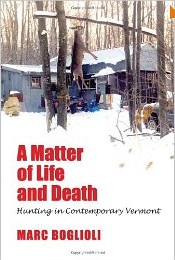Redneck culture, city culture: The clash over hunting
 Eighteen years ago, I had no doubt: hunting was wrong.
Eighteen years ago, I had no doubt: hunting was wrong.Not that I made big distinctions among kinds of violence. I abhorred the idea of industrial meat operations, and thought little about the alternatives. Why split hairs? A murdered animal was a murdered animal.
Hunting, however, did seem especially gratuitous. We no longer needed to do it. Thanks to agriculture we now had ample plant matter to survive on.
At the same time, though, I mourned the extermination of indigenous hunter-gatherer cultures around the world.
If someone had pointed out that contradiction—the fact that I wished for the survival of cultural traditions that involved killing animals—I probably would have argued that such cultures, like ours, could make moral progress away from hunting and meat-eating.
Yikes. Might I have made a good missionary?
I also would have argued that indigenous cultures respected animals in ways that Euro-American culture did not. My problem wasn’t really with human predation in all times and places. My problem was with hunting here and now: mainly white folks with guns.
Now, most of two decades later, a new book has me reflecting on the views I held back then.
In A Matter of Life and Death: Hunting in Contemporary Vermont, anthropologist Marc Boglioli argues that mainstream American culture is increasingly dominated by a particular way of seeing (and talking about) nature and animals. “Killing beautiful wild animals,” he writes in the Introduction, “simply does not fit into the mainstream urban worldview.”
Read More:

No comments:
Post a Comment